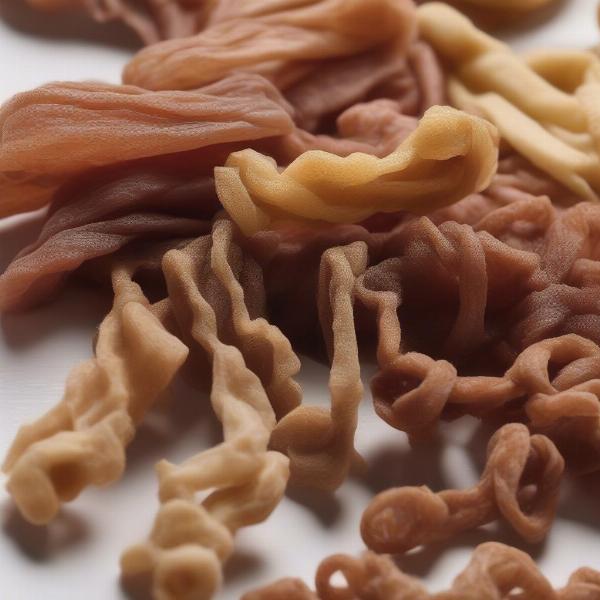Tendon treats for dogs are a popular, long-lasting chew option that can provide a range of benefits for your furry friend. From dental health to mental stimulation, these natural chews offer a satisfying and healthy way to keep your dog entertained and engaged. But are they right for every dog? This guide dives deep into the world of tendon treats, exploring their pros and cons, nutritional value, and safety considerations.
What are Tendon Treats for Dogs?
Tendon treats are typically made from dried beef tendons, although other animal sources like pork or lamb can also be used.  Hình ảnh các loại gân bò khô cho chó The drying process creates a tough, chewy texture that dogs love to gnaw on. These treats are naturally low in fat and high in protein, making them a relatively healthy option compared to many processed dog treats. They’re also a good source of collagen, a protein that supports joint health, which can be especially beneficial for senior dogs or breeds prone to joint issues.
Hình ảnh các loại gân bò khô cho chó The drying process creates a tough, chewy texture that dogs love to gnaw on. These treats are naturally low in fat and high in protein, making them a relatively healthy option compared to many processed dog treats. They’re also a good source of collagen, a protein that supports joint health, which can be especially beneficial for senior dogs or breeds prone to joint issues.
Benefits of Tendon Treats
Giving your dog tendon chews can offer a variety of benefits:
- Dental Health: The abrasive action of chewing on tendons can help scrape away plaque and tartar buildup, promoting healthier teeth and gums.
- Mental Stimulation: The long-lasting chew provides mental enrichment, helping to alleviate boredom and prevent destructive behaviors.
- Joint Support: The natural collagen in tendons can contribute to improved joint health and mobility.
- Natural and Nutritious: Tendon treats are a natural source of protein and other essential nutrients, without added artificial ingredients or fillers.
Choosing the Right Tendon Treat
Not all tendon treats are created equal. When selecting tendon treats for your dog, consider the following:
- Source: Look for treats made from high-quality, ethically sourced animal tendons.
- Thickness: Choose a thickness appropriate for your dog’s size and chewing strength. Thicker tendons are better for aggressive chewers.
- Processing: Opt for minimally processed treats without added chemicals, preservatives, or artificial flavors.
Potential Risks and Safety Considerations
While generally safe, tendon treats do come with some potential risks:
- Choking Hazard: Small pieces can break off, posing a choking hazard, especially for smaller dogs or puppies. Supervise your dog while they are chewing on a tendon treat.
- Digestive Upset: Some dogs may experience digestive upset, such as diarrhea or vomiting, if they consume too much tendon at once.
- Splintering: Some tendons can splinter, potentially causing injury to the mouth or digestive tract. Look for high-quality tendons that are less prone to splintering.
“Always supervise your dog when giving them any chew treat, including tendons,” advises Dr. Emily Carter, DVM. “This helps prevent choking hazards and allows you to monitor for any signs of digestive upset or other issues.”
How to Introduce Tendon Treats to Your Dog
Start by offering a small piece of tendon treat and observe your dog’s reaction. If they tolerate it well, you can gradually increase the size of the treat. Always provide fresh water alongside the treat to help with digestion.
Alternatives to Tendon Treats
If you’re looking for alternative chew options, consider collagen rolls for dogs, chicken feet, or other long-lasting chews. tendon chews for dogs You can find more information on suitable chews in our article on good chews for dogs. are chicken feet good for dogs For dogs with allergies or sensitivities, it’s essential to choose treats made from hypoallergenic ingredients.
Conclusion
Tendon treats can be a healthy and enjoyable addition to your dog’s diet, providing dental benefits, mental stimulation, and joint support. beef tendons for dogs However, it’s crucial to choose high-quality treats, supervise your dog while they’re chewing, and be aware of the potential risks. By following these guidelines, you can ensure your dog enjoys the benefits of tendon treats safely. collagen rolls for dogs
FAQ
- Are tendon treats good for puppies? While generally safe, it’s best to wait until a puppy is older and has stronger teeth before introducing tendon treats.
- How often can I give my dog a tendon treat? Tendon treats should be given in moderation, typically a few times a week.
- Can tendon treats replace meals? No, tendon treats should be given as a supplemental treat and not as a replacement for a balanced diet.
- What should I do if my dog chokes on a tendon treat? Seek immediate veterinary attention.
- Are all tendon treats the same? No, the quality and processing of tendon treats can vary significantly. Choose high-quality treats from reputable sources.
- Can tendon treats help with anxiety in dogs? The act of chewing can be calming for some dogs, but it’s not a substitute for professional help if your dog has severe anxiety.
- Are there any dogs that shouldn’t have tendon treats? Dogs with allergies to the specific animal source, puppies, and senior dogs with weakened teeth should avoid or be carefully monitored with tendon treats.
ILM Dog is a leading international dog website dedicated to providing expert advice on dog care and wellbeing. We cover a wide range of topics, from breed selection and health care to training, nutrition, grooming, and product recommendations. With our expert insights and practical tips, we empower dog owners worldwide to provide the best possible care for their furry companions. For inquiries, contact us at [email protected] or +44 20-3965-8624. Visit ILM Dog for more information.